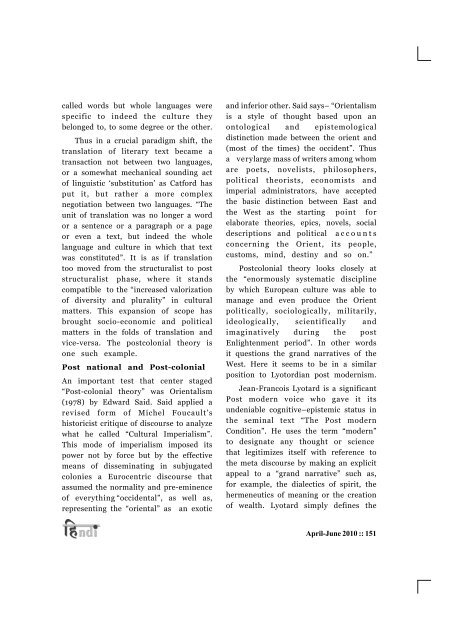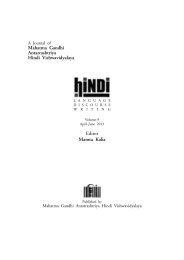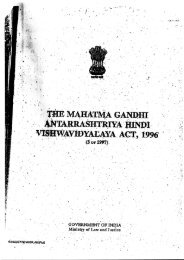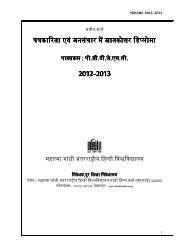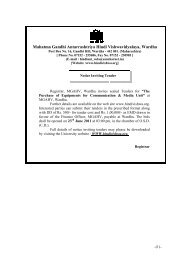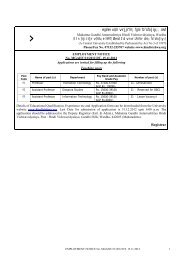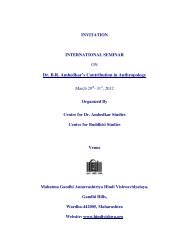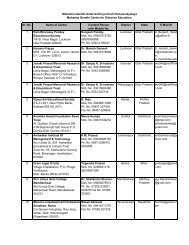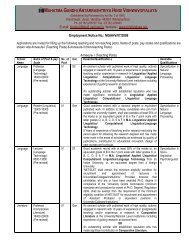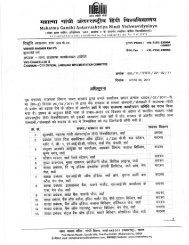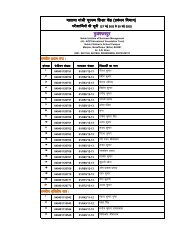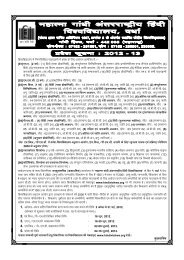Mamta Kalia
Mamta Kalia
Mamta Kalia
Create successful ePaper yourself
Turn your PDF publications into a flip-book with our unique Google optimized e-Paper software.
called words but whole languages were<br />
specific to indeed the culture they<br />
belonged to, to some degree or the other.<br />
Thus in a crucial paradigm shift, the<br />
translation of literary text became a<br />
transaction not between two languages,<br />
or a somewhat mechanical sounding act<br />
of linguistic ‘substitution’ as Catford has<br />
put it, but rather a more complex<br />
negotiation between two languages. “The<br />
unit of translation was no longer a word<br />
or a sentence or a paragraph or a page<br />
or even a text, but indeed the whole<br />
language and culture in which that text<br />
was constituted”. It is as if translation<br />
too moved from the structuralist to post<br />
structuralist phase, where it stands<br />
compatible to the “increased valorization<br />
of diversity and plurality” in cultural<br />
matters. This expansion of scope has<br />
brought socio-economic and political<br />
matters in the folds of translation and<br />
vice-versa. The postcolonial theory is<br />
one such example.<br />
Post national and Post-colonial<br />
An important test that center staged<br />
“Post-colonial theory” was Orientalism<br />
(1978) by Edward Said. Said applied a<br />
revised form of Michel Foucault’s<br />
historicist critique of discourse to analyze<br />
what he called “Cultural Imperialism”.<br />
This mode of imperialism imposed its<br />
power not by force but by the effective<br />
means of disseminating in subjugated<br />
colonies a Eurocentric discourse that<br />
assumed the normality and pre-eminence<br />
of everything “occidental”, as well as,<br />
representing the “oriental” as an exotic<br />
and inferior other. Said says– “Orientalism<br />
is a style of thought based upon an<br />
ontological and epistemological<br />
distinction made between the orient and<br />
(most of the times) the occident”. Thus<br />
a verylarge mass of writers among whom<br />
are poets, novelists, philosophers,<br />
political theorists, economists and<br />
imperial administrators, have accepted<br />
the basic distinction between East and<br />
the West as the starting point for<br />
elaborate theories, epics, novels, social<br />
descriptions and political accounts<br />
concerning the Orient, its people,<br />
customs, mind, destiny and so on.”<br />
Postcolonial theory looks closely at<br />
the “enormously systematic discipline<br />
by which European culture was able to<br />
manage and even produce the Orient<br />
politically, sociologically, militarily,<br />
ideologically, scientifically and<br />
imaginatively during the post<br />
Enlightenment period”. In other words<br />
it questions the grand narratives of the<br />
West. Here it seems to be in a similar<br />
position to Lyotordian post modernism.<br />
Jean-Francois Lyotard is a significant<br />
Post modern voice who gave it its<br />
undeniable cognitive–epistemic status in<br />
the seminal text “The Post modern<br />
Condition”. He uses the term “modern”<br />
to designate any thought or science<br />
that legitimizes itself with reference to<br />
the meta discourse by making an explicit<br />
appeal to a “grand narrative” such as,<br />
for example, the dialectics of spirit, the<br />
hermeneutics of meaning or the creation<br />
of wealth. Lyotard simply defines the<br />
April-June 2010 :: 151


